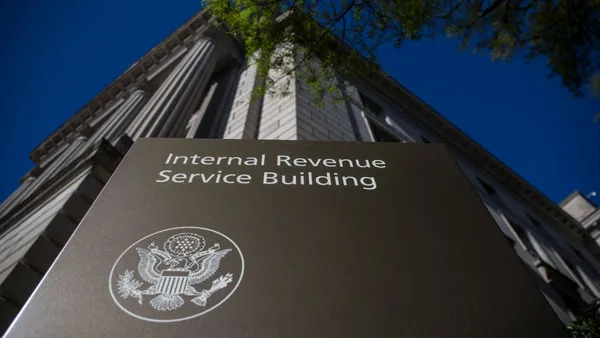Dive Brief:
- Twenty-two Republican state attorneys general sent a letter Wednesday to the signatories of the Net Zero Financial Services Provider Alliance, alleging the coalition’s global goal of net-zero greenhouse gas emissions by 2050 could represent antitrust and consumer protection law violations.
- The letter, led by Tennessee attorney general Jonathan Skrmetti, claims that the signatories to the alliance’s pledge — which include the nation’s four largest accounting firms — wield enough combined market power to potentially pressure other companies to comply with the organization’s “policy preferences.”
- The claims are the latest salvo from Republican state offices, who are attacking ESG policies on multiple fronts. Part of the issue for the attorneys general is the alliance’s alignment with the Paris Climate Agreement and targets set for companies to reach net zero.
Dive Insight:
The Skrmetti-led letter draws issue with the fact that the alliance’s signatories are direct competitors and accuses the group of “using their market influence to enforce their collective climate agenda.”
“Decisions about energy policy should be made by our elected representatives, not by transnational corporate alliances,” Skrmetti said in a statement.
The alliance includes accounting’s “Big Four” — Deloitte, Ernst & Young, PricewaterhouseCoopers and KPMG — who collectively represent almost 75% of the global accounting market. The international coalition receives accreditation from the United Nations’ Race to Zero project and also includes other U.S. financial service providers like Bloomberg, S&P Global, Moody’s and Morningstar.
Members of the alliance commit to aligning their business practices with the Paris Climate Agreement’s goal of limiting the global temperature rise to less than 1.5 degrees Celsius over pre-industrial levels. Along the way to becoming net zero in 2050, signatories commit to setting emissions reduction targets that are “consistent with a fair share” of the work for halving emissions by 2030.
“The substantial commitments you have made as NZFSPA signatories give us pause, as they do not appear consistent with our laws protecting consumers,” the letter says. “Although many of you are direct competitors with one another, you have collectively agreed to coordinate the ‘alignment’ of your products and services under the guise of a shared ideological vision.”
The attorneys general said the organization’s commitment to abide by any legal, regulatory or professional obligations doesn’t ease concerns about potential antitrust and consumer protection violations.
The attorneys general made 11 requests for information on communications between alliance members, the reasons why each company joined the group and details of any conversations around interim targets in line with the pledges.
The state attorneys also asked for details about actions companies have or have not taken to help align their practices with the 2050 and 2030 targets.
Attorneys general from Alabama, Alaska, Arkansas, Idaho, Indiana, Iowa, Kansas, Kentucky, Louisiana, Mississippi, Missouri, Montana, Nebraska, New Hampshire, Ohio, Oklahoma, South Carolina, Utah, Virginia, West Virginia and Wyoming signed onto the letter.
A similar group of Republican state attorneys general previously targeted a UN-aligned net zero alliance. Fourteen Republican state attorneys general began an investigation into the Net-Zero Banking Alliance last fall, probing climate pledges by those signatories on allegations the banks blocked credit to oil companies.
Additional letters have been sent to BlackRock CEO Larry Fink by state attorneys, and governors in 19 states pledged earlier this year to utilize state pensions to influence financial services providers to limit the use of ESG in pension fund investment management.
The Paris Climate Agreement targets set back in 2015, and at issue in the letter, may already be outdated. The Intergovernmental Panel on Climate Change reported in March that the world is likely to overshoot global warming targets















